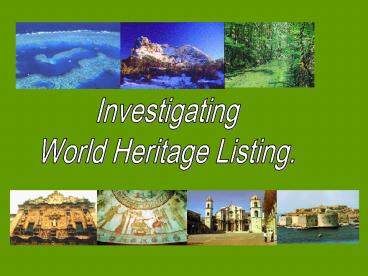Investigating - PowerPoint PPT Presentation
1 / 10
Title:
Investigating
Description:
... threatened species of animals and plants and areas with scientific, conservation ... contain the natural habitats of endangered animals; or it may be a setting ... – PowerPoint PPT presentation
Number of Views:49
Avg rating:3.0/5.0
Title: Investigating
1
Investigating World Heritage Listing.
2
The Convention.
The United Nations Educational, Scientific and
Cultural Organization (UNESCO) seeks to encourage
the identification, protection and preservation
of cultural and natural heritage around the world
considered to be of outstanding value to humanity
. This is embodied in an international treaty
called the Convention concerning the Protection
of the World Cultural and Natural Heritage ,
adopted by UNESCO in 1972. Cultural heritage
refers to monuments, groups of buildings and
properties with historical, aesthetic,
archaeological, scientific, ethnological or
anthropological value. Natural heritage refers
to outstanding physical, biological and
geological formations, habitats of threatened
species of animals and plants and areas with
scientific, conservation or aesthetic value.
3
The task.
- Imagine that you work for the United Nations.
Your job is to prepare a report that recommends
including a landmark for World Heritage Listing.
It can be a cultural or natural landmark. - As part of your study of another country, begin
to research an important natural or cultural
landmark that you think would be worth a
recommendation. - Use the investigation model to help you shape,
organize and construct the types of questions
about the landmark. - Answering the questions and following the
investigation process will help you prepare the
basic information and data you need for your
report. - Use the report scaffold to shape and organize
your ideas and research material. - Remember - the future of an important landmark in
your hands!
4
The selection criteria.
- To be included on the World Heritage List, a
property must satisfy the selection criteria
adopted by the Committee. - A cultural monument could be a masterpiece of
creative genius have exerted great architectural
influence be associated with ideas or beliefs of
universal significance or it may be an
outstanding example of a traditional way of life
that represents a certain culture. - A natural property may exemplify major stages of
the earth's history represent ongoing ecological
and biological processes contain the natural
habitats of endangered animals or it may be a
setting of exceptional beauty.
5
- Focus Habit of Mind
- Questioning and Posing Problems.
- Things to remember
- Have a questioning attitude
- Know what data you need
- Develop questioning strategies to produce data.
6
Investigation Model.
- What event or idea do I wish to explain?
- What do people already know?
- What confusions do people have about the event
or idea? - What suggestions do I have for clearing up the
confusions? - How do I defend my suggestions?
7
Melbourne Exhibition Buildings.
The Royal Exhibition Building and its surrounding
Carlton Gardens were designed for the great
international exhibitions of 1880 and 1888 in
Melbourne. The building and grounds were designed
by Joseph Reed. The building is constructed of
brick and timber, steel and slate. The property
is typical of the international exhibition
movement which saw over 50 exhibitions staged
between 1851 and 1915 in venues including Paris,
New York, Vienna, Calcutta, Kingston (Jamaica)
and Santiago (Chile). All shared a common theme
and aims to chart progress through displays of
industry from all nations.
Listed 2004
8
Great Barrier Reef.
The Great Barrier Reef is a site of remarkable
variety and beauty on the north-east coast of
Australia. It contains the world's largest
collection of coral reefs, with 400 types of
coral, 1,500 species of fish and 4,000 types of
mollusk. It also holds great scientific interest
as the habitat of species such as the dugong
('sea cow') and the large green turtle, which are
threatened with extinction.
Listed 1981
9
Hints and reminders.
- Use data to support your conclusions, arguments
and assumptions. - Consider alternative points of view.
- Try to link your ideas and understandings.
- Remember to write clearly in order to best
explain the reasoning for your recommendation. - You are trying to convince UNESCO that your
landmark is worth preserving for the benefit of
the whole world community.
10
The report.
- Why should your landmark be accepted?
- What is the significance of your landmark?
- Why should the world care?
- In what ways is your landmark unique?
The learning journal.
- What did you learn about questions?
- What was difficult about posing a question?
- How did you know if a question was worthwhile?
- What questions were hard to answer? Why?































